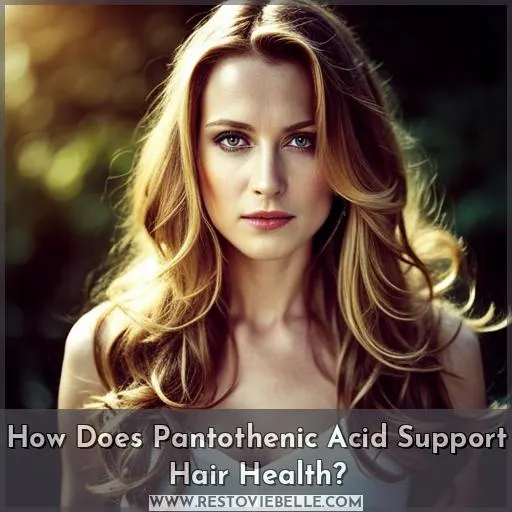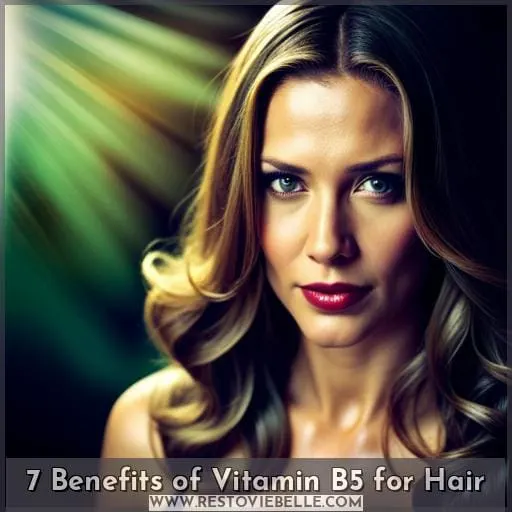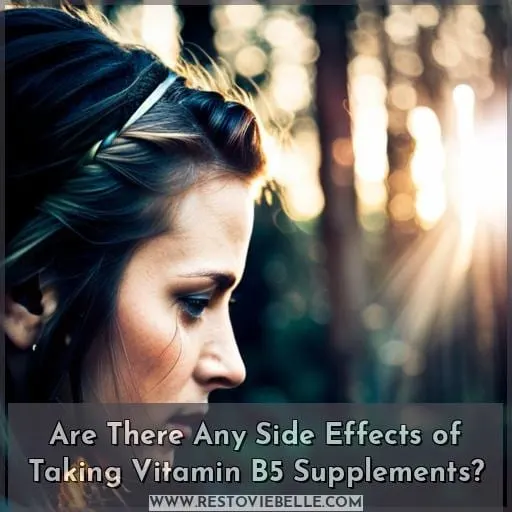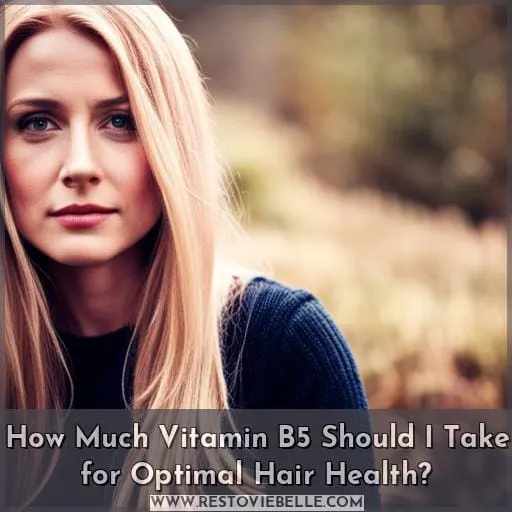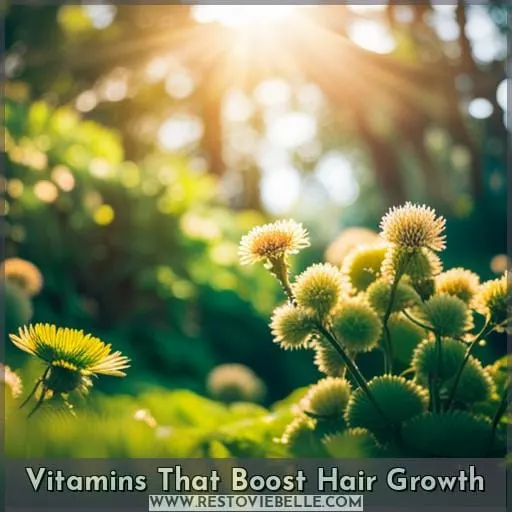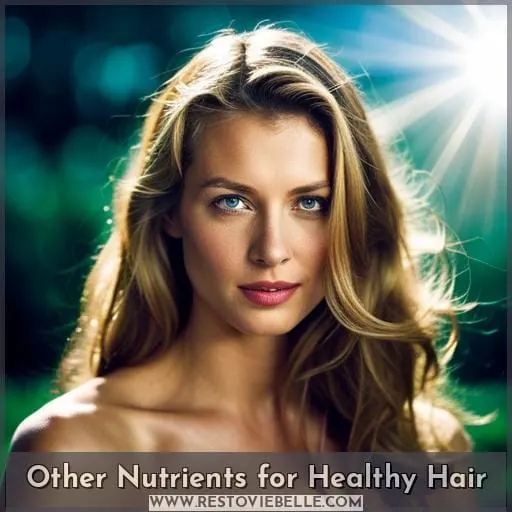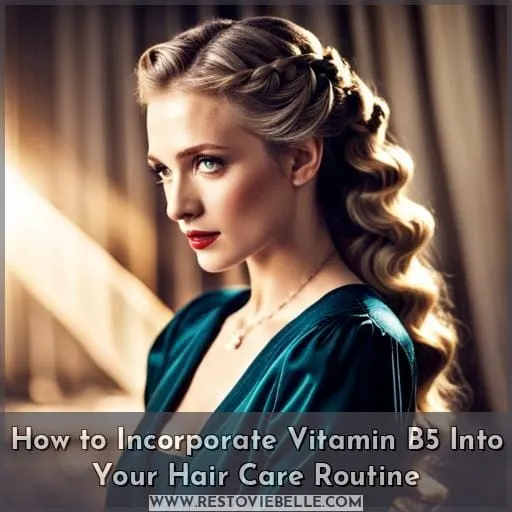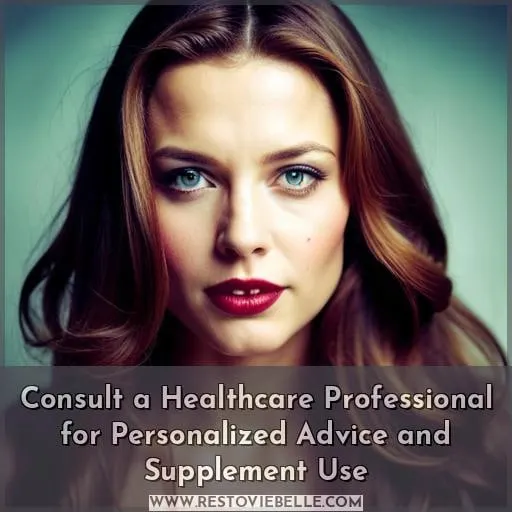This site is supported by our readers. We may earn a commission, at no cost to you, if you purchase through links.
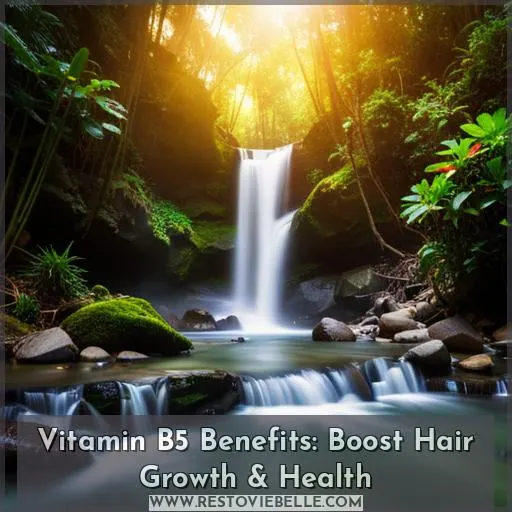 Are you looking for ways to improve the health of your hair and prevent hair loss? Vitamin B5 is a key ingredient that can make a big difference in promoting healthy locks. With its ability to reduce split ends, enhance shine, and stimulate growth, vitamin B5 (also known as Panthenol) has long been hailed as one of the most effective vitamins when it comes to nourishing tresses.
Are you looking for ways to improve the health of your hair and prevent hair loss? Vitamin B5 is a key ingredient that can make a big difference in promoting healthy locks. With its ability to reduce split ends, enhance shine, and stimulate growth, vitamin B5 (also known as Panthenol) has long been hailed as one of the most effective vitamins when it comes to nourishing tresses.
Here we’ll explore how pro-vitamin B5 can help you achieve healthier-looking strands and why it’s worth adding this nutrient into your beauty routine.
Table Of Contents
- Key Takeaways
- How Does Pantothenic Acid Support Hair Health?
- 7 Benefits of Vitamin B5 for Hair
- What Are the Best Sources of Vitamin B5?
- Are There Any Side Effects of Taking Vitamin B5 Supplements?
- How Much Vitamin B5 Should I Take for Optimal Hair Health?
- Vitamins That Boost Hair Growth
- Other Nutrients for Healthy Hair
- How to Incorporate Vitamin B5 Into Your Hair Care Routine
- Consult a Healthcare Professional for Personalized Advice and Supplement Use
- Conclusion
Key Takeaways
- Promotes healthy hair
- Reduces split ends
- Enhances shine
- Stimulates growth
How Does Pantothenic Acid Support Hair Health?
You can support your hair’s health and growth with pantothenic acid, a nutrient that helps rebuild damaged shafts and protect it from environmental damage. Vitamin B5 is essential for this process as it works to strengthen the follicles themselves, allowing them to better resist breakage while promoting overall moisture retention of both the scalp and strands.
Eating foods rich in vitamin B5 will help ensure adequate intake of this important nutrient. Sources include meats, dairy products, vegetables, and whole grains. All of these should be consumed regularly for optimal benefit.
Additionally, applying topical products containing Panthenol (a derivative of vitamin B5) directly onto the scalp or other areas affected by thinning hair may also provide some added benefits when looking to maximize potential results.
These benefits include increased shine and fullness due to its moisturizing properties.
Ultimately, when actively seeking ways to promote healthier locks while preventing future loss or stunted growth, look no further than supplementing with pantothenic acid-rich diets along with using appropriate topical treatments where necessary!
7 Benefits of Vitamin B5 for Hair
Are you seeking ways to enhance the shine, hydration, and elasticity of your hair? Vitamin B5 (pantothenic acid) can assist with all of that and more! It aids in minimizing tangles and strengthening elasticity while promoting healthy hair growth.
Improved Shine
By using panthenol products, you can give your hair improved shine and luster. Panthenol acts as a conditioning agent to enhance the natural glossy strands of your hair. Adding it to your existing hair care routines will help bring out radiant locks with added vibrancy and texture.
If you’re looking for product recommendations, look for ones that contain Vitamin B5 or pantothenic acid. These ingredients make excellent moisturizing agents perfect for those with dry hair who want to breathe new life into their manes.
Increased Hydration
Using panthenol-containing products can help boost hydration, leaving your hair feeling delightful and soft. Vitamin B5 helps maintain the moisture balance of the scalp to prevent dryness and increase shine.
It also helps protect against environmental conditions such as sun exposure or chemical treatments that may damage hair health.
Deep conditioning with a product containing vitamin B5 is an easy way to give your locks some extra love while keeping them healthy and hydrated over time.
Minimizes Tangles
Applying panthenol-containing products to your hair can help minimize tangles and keep it looking smooth and healthy. Panthenol helps nourish the scalp, reduces friction between strands, prevents knots from forming in the first place, and makes detangling easier.
To manage tangles, use a wide-toothed comb; spray conditioner on dry hair before showering; avoid tight hairstyles that pull at roots; consider using oils or leave-in conditioners after washing your hair.
Reinforces Elasticity
You’ll love how Vitamin B5 reinforces your hair’s elasticity, so those tangles become a thing of the past. Pro-vitamin B5 helps strengthen and fortify each follicle for improved resilience against breakage.
It also boosts keratin production to help maintain healthy growth cycles and promote overall hair health.
Promotes Hair Growth
Vitamin B5 helps nourish your scalp and stimulate follicles, promoting hair growth. Including it in your hair care routine is a great way to prevent loss and support future growth.
Dietary choices are key; incorporate foods like eggs, potatoes, legumes, or fortified cereals into your diet for natural sources of vitamin B5. Supplements can also help ensure optimal levels of the nutrient if you’re deficient.
Hair health requires an overall approach that includes healthy habits such as avoiding excess heat styling or over-shampooing too often, which can damage strands and weaken follicles from root to tip!
Nutrient deficiencies, including zinc, iron, and vitamins C & A, should be addressed when striving for strong locks. Additionally, incorporating panthenol-containing products can protect from environmental factors like pollution or UV rays that may otherwise lead to breakage down the line.
What Are the Best Sources of Vitamin B5?
To get the most out of Vitamin B5 for your hair, you’ll want to look for natural sources in your diet like meats, dairy, vegetables, and whole grains. Eating a variety of nutrient-rich foods can help increase vitamin B5 levels in the body.
Foods such as beef liver, salmon, and spinach are great sources of this vitamin that will keep your hair looking healthy.
Additionally, adding an intensive weekly hair mask with panthenol can also provide beneficial effects on bleached or damaged hairs. It reduces frizz, increases shine, and strengthens each strand from root to tip.
With so many benefits associated with Vitamin B5, there’s no reason not to make sure it’s part of any good haircare routine!
Are There Any Side Effects of Taking Vitamin B5 Supplements?
Although Vitamin B5 can provide numerous benefits for hair health, it’s important to be aware of any potential side effects associated with taking supplements. When taken in recommended doses, there are few known risks; however, exceeding the daily dosage may lead to diarrhea and vitamin imbalances.
Additionally, certain drugs or medical conditions can interact negatively with Vitamin B5 supplementation. Individuals should consult their doctor before increasing intake from dietary sources or starting a supplement regimen.
Some signs of an adverse reaction include skin irritation if used topically at concentrations higher than 5%, as well as digestive issues like nausea and bloating when taken orally in large amounts over long periods of time.
It is thus recommended that individuals take care not to exceed the maximum daily dose and monitor reactions carefully while using products containing panthenol (Vitamin B5).
Good dietary sources of vitamin B5 include fish such as salmon or tuna; grains like quinoa and oats; dairy including yogurt or cottage cheese; legumes like chickpeas, beans, and lentils; and vegetables such as spinach, bell peppers, and broccoli.
Fresh foods are preferable since processing reduces nutrient value significantly. Including these natural ingredients into meals regularly will help ensure adequate levels without needing additional supplementation unless directed by a healthcare professional for specific reasons related to age, life stage, or underlying condition(s).
How Much Vitamin B5 Should I Take for Optimal Hair Health?
When it comes to hair loss prevention, many people turn to vitamin B5 supplements. But how much should you take for optimal hair health? To get the most out of this essential nutrient, consider these three aspects: ingredient list, dietary sources, and supplement considerations.
If taking a supplement that contains panthenol or other forms of Vitamin B5 such as D-Panthenol or DL-Panthenol, check the label to make sure it’s not too high in concentration; 1% – 5% is ideal for skin hydration with minimal risk of irritation.
Additionally, look out for other ingredients like Vitamin E, which can enhance the effects on your scalp and follicles when used together with Pantothenic acid (Vitamin B5).
Dietary sources are key when trying to maintain healthy levels throughout your body, so prioritize foods rich in Vitamin B5, including fish, grains, dairy products, legumes, and vegetables. Fresh options are best since cooking can diminish its potency, but if convenience is an issue, then canned goods may be just fine.
Finally, keep in mind that each individual needs different amounts depending on their age and life stage, so consult a doctor before making any changes regarding supplementation, especially if they have pre-existing medical conditions or medications they’re currently taking.
Vitamins That Boost Hair Growth
Are you suffering from hair loss or looking to promote healthy hair growth? B Vitamins, Vitamin C, Iron, and Vitamin A can provide the necessary nutrients for a healthier scalp. Studies have found that these vitamins help prevent hair damage while promoting thicker and stronger locks.
B Vitamins
You should be aware of the B Vitamins, as they play a key role in encouraging healthy hair growth. Research suggests that taking Vitamin B5 can lead to a 43% increase in hair thickness and shine. Deficiencies of these vitamins may contribute to thinning hair and loss, which is why it is essential for overall scalp health.
Supplementation with vitamin shots or capsules may help reverse this issue while also providing anti-inflammatory properties for skin regeneration during winter haircare routines.
Vitamin C
Vitamin C helps fight free radicals and promotes collagen production for hair health, so you can keep your locks looking luscious. It’s found in nutrient-rich foods like strawberries, oranges, kiwi, broccoli, and kale.
Incorporating these into your diet can help maintain healthy hair growth while protecting against damage from heat styling or an itchy scalp.
Iron
Iron, found in spinach, egg yolks, and beef, is linked to hair loss, according to a study. Iron deficiency can lead to thinning hair or even baldness. Avocado is also high in iron and makes an excellent addition for boosting your daily intake of this essential mineral.
If you’re considering taking an iron supplement for your locks, consult a hairdresser first. They can examine the volume and texture of your strands, as well as any underlying causes like grey hairs or dry scalp conditions that could benefit from further dietary changes instead of supplements.
Your doctor may recommend specific levels if they diagnose you with anemia, another condition often caused by inadequate amounts of iron in the body. However, it’s best not to take too much without medical advice due to potential side effects such as constipation or nausea.
Vitamin A
Reap the rewards of Vitamin A, as its retinoic acid helps regulate your scalp’s moisture levels and keeps dandruff at bay. Incorporate it into your diet with fortified cereals, spinach, carrots, mangoes, or kidney beans.
For better vision protection, take eggs or mushrooms to get enough vitamin A in your system. For healthy skin and hair, you can also try salmon or milk. It is a powerful antioxidant that prevents cell damage from free radicals, which leads to aging signs like wrinkles and age spots on the skin.
Vitamin A deficiency can lead to dry eyes, so make sure you have an adequate intake of this essential micronutrient daily! Supplementing with it will help boost collagen production for healthier hair growth while avoiding breakage due to heat styling tools or sun exposure.
Get all these benefits by adding foods rich in vitamin A such as leafy greens like kale and broccoli, bell peppers, beef liver, sweet potatoes, and cantaloupe into meals every day!
Omega-3 Fatty Acids
Load up on omega-3 fatty acids to help nourish your hair from the inside out and give it a healthy glow. Omega-3 benefits are numerous, including improved skin health, better mental focus, and energy levels, as well as increased hair growth.
Dietary sources of omega-3s include cold water fish like salmon and tuna, walnuts, flaxseed oil, or chia seeds. Studies have shown that when taken in appropriate amounts by adults over 20 weeks, omega-3s can reduce inflammation, which can impact scalp health, leading to thicker strands of hair with more shine.
Supplementation is also an option, but consult your doctor first for advice on dosage, etc., since there could be contraindications due to existing medical conditions or medications being taken currently.
Other Nutrients for Healthy Hair
Are you looking for a way to boost your hair growth? Vitamins are essential, but other nutrients such as zinc, vitamin D, and protein can also have beneficial effects. Learn more about how these three key elements help improve the health of your hair follicles and strands.
Zinc
Reach for zinc, an essential mineral that helps your hair stay strong and healthy. Zinc supports protein synthesis in the scalp and can be taken as a supplement or obtained from foods like oysters, spinach, beef, and legumes.
It also aids skin health by promoting collagen production. Signs of deficiency include poor appetite, slow wound healing, and decreased sense of taste and smell. Absorption is affected by calcium intake and alcohol consumption, so consult a doctor before taking supplements if necessary.
Vitamin D
Unlock the power of Vitamin D for your hair health – it can help support follicles and growth! Studies have linked a Vitamin D deficiency to hair loss, making sun exposure an important part of promoting healthy locks.
Natural sources include 15 minutes in the sun daily, eggs, mushrooms, salmon, and milk; while supplements are also available. Hair follicles need vitamin D to prevent breakage from heat styling or pollution damage too.
Protein
Fuel your mane with protein-packed foods like salmon and eggs to help create strong, healthy hair. Protein intake is essential for proper hair growth and maintenance as it helps build cells that contribute to the structure of each strand.
Eating a balanced diet rich in various proteins can boost strength, prevent breakage, improve shine, and reduce split ends.
Nutrient synergy is also important. Try combining other vitamins such as vitamin A or E with protein sources for maximum benefits! Tailor your hair care routine according to individual needs. Those with dry scalp may benefit from natural oils, while others might need a more moisturizing shampoo or conditioner containing proteins derived from plants or animals.
How to Incorporate Vitamin B5 Into Your Hair Care Routine
Healthy hair starts with a good hair care routine, and incorporating vitamin B5 is key to achieving the perfect look. Shampoos and conditioners enriched with panthenol, leave-in treatments for intense hydration, deep conditioning masks for nourishment from root to tip – these are all ways of benefiting from this important vitamin.
Shampoos and Conditioners
Upgrade your hair care routine with shampoos and conditioners containing panthenol to promote healthier hair. Panthenol, a derivative of vitamin B5, helps rebuild damaged hair shafts and supports growth.
It protects from heat styling, pollution, and sun damage while adding shine for fuller-looking locks.
Vitamin B5 also improves the scalp’s natural hydration levels, keeping it moisturized for healthy regrowth—a must-have if you’re fighting dandruff or thinning strands! Haircare products enriched with this ingredient are an easy way to enjoy its benefits without taking supplements or drastically changing your diet.
Leave-in Treatments
Reap the benefits of Vitamin B5 with leave-in treatments that nourish and protect your hair.
- Hair hydration: Revitalize dry, damaged locks to improve manageability and shine.
- Scalp care: Reduce flakiness while promoting a healthy scalp environment for better growth.
- Hair strengthening: Strengthen weakened strands for more resistant hair against breakage.
- Hair nourishment: Replenish essential vitamins and minerals to stimulate follicles from root to tip.
- Hair revitalization: Restore vitality with a powerful combination of nutrients designed specifically for healthier, stronger tresses.
Incorporate leave-in treatments containing Panthenol (Vitamin B5) into your regular haircare regime today – you’ll be surprised at the difference it can make!
Hair Masks
Treat your tresses to the nourishing power of panthenol with a weekly hair mask. An old adage says ‘beauty starts from within’. DIY recipes are easy to make with natural ingredients, like eggs, avocados, and honey.
To get started on healthy hair habits, mix these goodies into a paste. Apply the paste all over for thirty minutes or more.
For extra moisturizing treatments, use vitamin B5-rich products like shampoos and conditioners.
Dietary Sources
Try incorporating dietary sources of vitamin B5 into your diet to nourish and support healthy hair growth. Foods like eggs, avocados, beef, potatoes, chicken, and nuts are nutrient-rich sources that can help reduce hair loss and dandruff.
Additionally, fortified cereals such as spinach, carrots, mangoes, and kidney beans all contain Vitamin A, which helps regulate retinoic acid in the scalp while helping to prevent dandruff too!
Lastly, brewer’s yeast is a great source for Vitamin H (Biotin), which promotes protein utilization for stronger hair strands.
- Eggs
- Avocados
- Beef
- Potatoes
- Chicken
- Nuts
Consult a Healthcare Professional for Personalized Advice and Supplement Use
For personalized advice on incorporating Vitamin B5 into your hair care routine, it’s best to consult a healthcare professional. They can assess your overall health and provide tailored advice for supplement dosage and dietary sources of vitamin B5 to ensure proper nutrient balance.
Hair loss prevention is possible with the right diet, lifestyle changes, and products containing panthenol or pro-vitamin B5. Products like shampoos, conditioners, and detanglers contain panthenol, which helps rebuild damaged hair shafts caused by heat styling or sun exposure.
Here are some dietary sources of vitamins that are beneficial for hair health:
Vitamin C:
- Strawberries
- Oranges
- Kiwi
- Broccoli
- Kale
- Bell Peppers
Biotin (Vitamin H):
- Eggs
- Sardines
- Nuts
- Legumes
- Bananas
- Mushrooms
- Brewer’s Yeast
Iron:
- Spinach
- Egg Yolk
- Beef
- Black Beans
Vitamin A:
- Fortified Cereals
- Spinach
- Carrots
- Mangoes
- Kidney Beans
- Eggs
Vitamin D:
- 15 minutes of daily sunlight
- Mushrooms
- Salmon
- Milk
It’s important to note that taking excessive amounts of supplements can cause diarrhea and imbalances in other vitamins. Therefore, it’s crucial to adhere strictly to dosage instructions provided by a doctor or nutritionist when taking any form of supplementation for improved hair growth results.
Remember that healthy-looking locks start from within – nourish yourself with nutritious foods while using topical products rich in nutrients like Pantothenic Acid (also known as vitamin B5).
Conclusion
You now have the knowledge to give your hair the nourishment it needs with vitamin B5. Not only does this essential vitamin reduce hair loss, dandruff, and strengthen hair follicles, it also helps to rebuild damaged hair shafts, promote hair growth, and fight free radicals.
Vitamin B5 is often found in various self-care products like shampoos, conditioners, de-tanglers, hair mousses, sprays, and styling gels. It can also be sourced from foods like eggs, beef, avocados, potatoes, nuts, and legumes.
Proper nutrition is key to having healthy hair, and vitamin B5 is an important part of the equation. So give your hair the boost it needs with vitamin B5 to experience its full benefits and maintain healthy hair.
